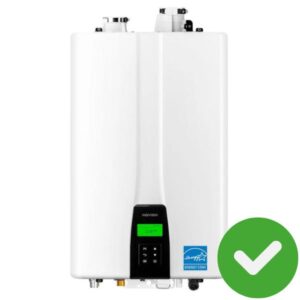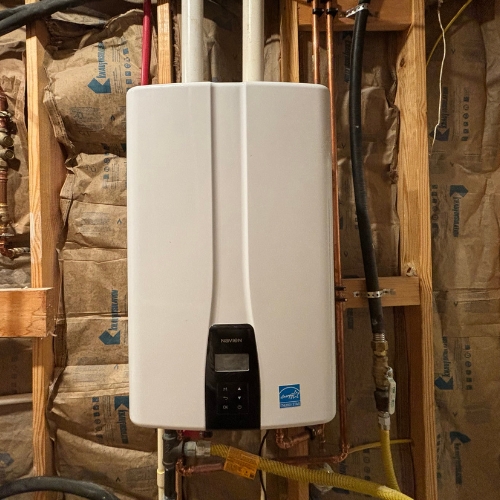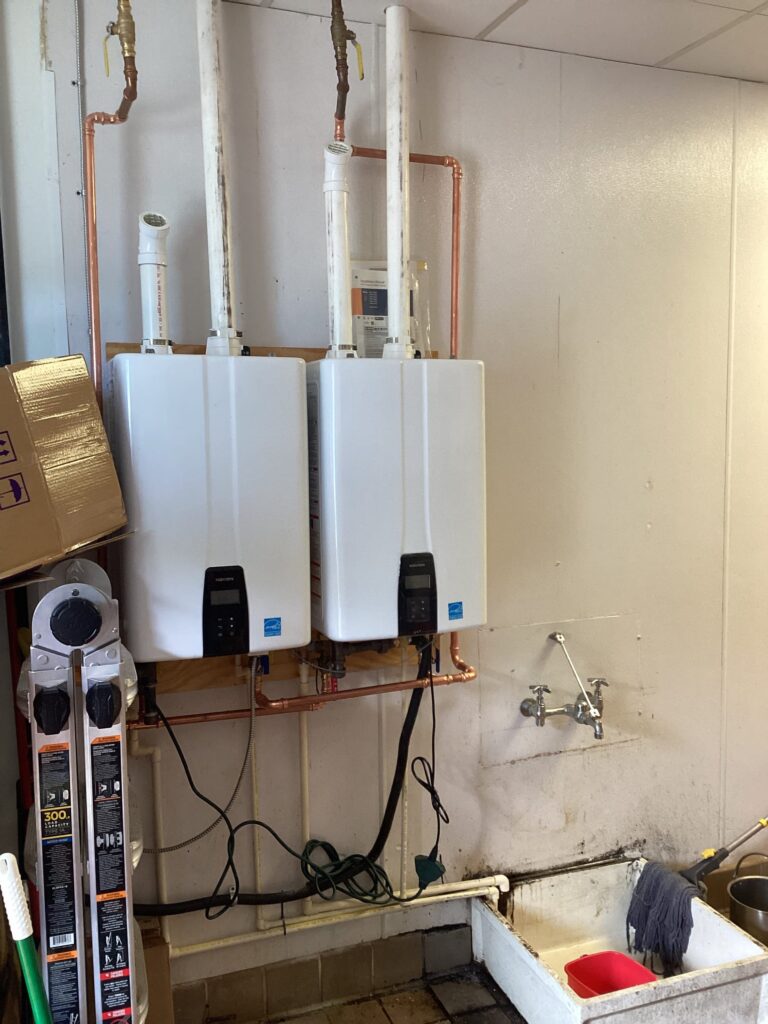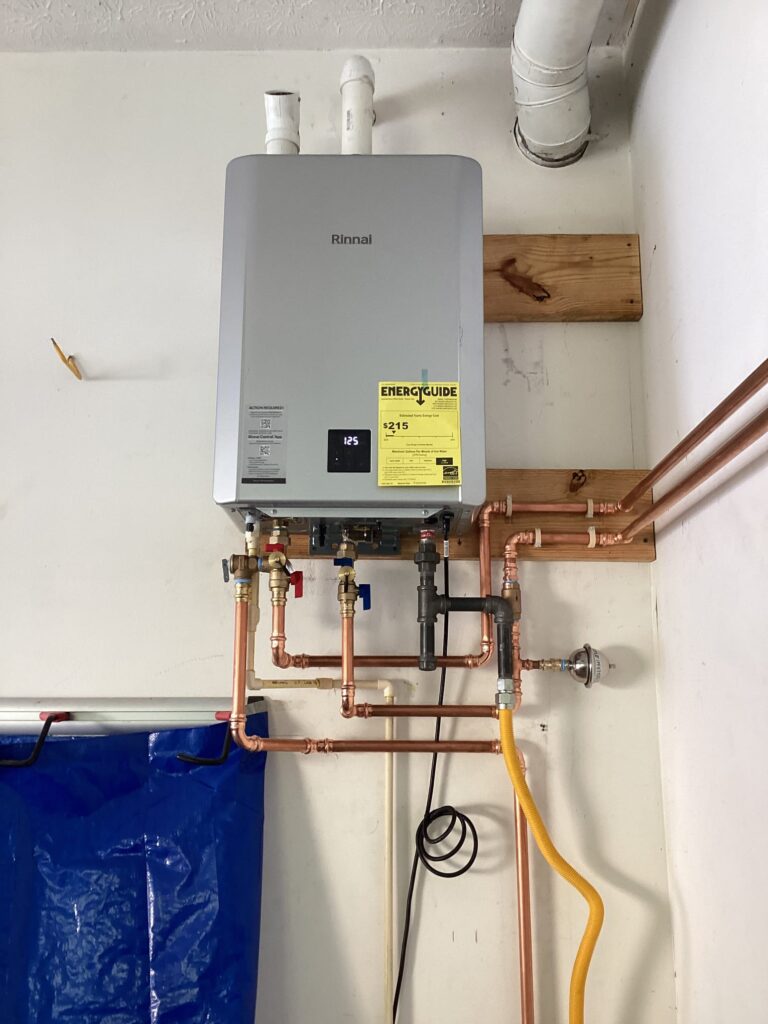How Does a Tankless Water Heater Work?
Tankless water heaters are the new standard in water heating technology. Most of our customers are interested in exploring tankless options. One of the most common questions we’re asked about these systems is, “how does a tankless water heater work?” A tankless water heater, also called an on-demand water heater, heats water only when needed, unlike traditional tank-style water heaters that store and continuously heat a large volume of water. This makes tankless units energy-efficient and capable of providing continuous hot water, especially in homes that use natural gas or propane for heating.
How a Gas Tankless Water Heater Operates
- Water Flow Activation:
When you turn on a hot water tap or an appliance, cold water flows into the tankless unit through the inlet pipe. A flow sensor detects the incoming water, triggering the system to start heating the water. - Ignition and Gas Burner:
In a gas tankless water heater, a gas burner ignites to generate heat. The water flows through a heat exchanger that transfers the heat from the burner to the water. The higher the water flow rate, the more gas the system burns to maintain the desired water temperature. - Heat Exchanger:
The heat exchanger is the heart of the system. As cold water passes through it, the exchanger absorbs heat generated by the gas burner and transfers that heat to the water. This results in a rapid increase in water temperature before it leaves the unit and flows to your faucets or appliances. - Modulating Valve:
Most modern tankless water heaters have a modulating gas valve, which adjusts the amount of gas burned based on the water flow and temperature. This ensures consistent hot water output while maximizing energy efficiency. - Exhaust and Venting:
Since gas tankless water heaters produce combustion gasses (like carbon monoxide), they require proper venting to safely expel these gasses outside the home. Most tankless systems use sealed combustion venting, where air is drawn from outside and the exhaust gasses are vented back outside through a pipe.
Why Searching, “How Does a Tankless Water Heater Work” is an Important First Step
Sometimes plumbing, especially something as complicated as a tankless water heater, can feel like it runs on magic. With a basic understanding of how a tankless water heater works, you’ll be able to better understand the importance of tankless maintenance, and any diagnosis a plumber may have if you ever need a tankless repair.
By searching, “how does a tankless water heater work?” you’re getting informed about the basics of the new standard in water heating technology. While you still may not be fluent in tankless service and repair, a grasp on the basics will make you an informed and proactive homeowner.
A Note on Proper Installation
The above is a simplified explanation of how a tankless water heater should work. Unfortunately, we see malfunctioning tankless water heaters installed by builders, handymen, or non-certified plumbers every day. These tankless water heater systems are sophisticated technology that require precise installation to function properly and deliver the endless hot water they’re designed for.
While tankless water heaters are a wonderful feature in any home when installed correctly, improper installation can lead to frequent malfunctions, inefficiency, or even safety concerns. Instead of enjoying the energy efficiency and constant supply of hot water, you could end up dealing with problem after problem. That’s why it’s crucial to hire an experienced and knowledgeable plumber to install your tankless water heater. At Aaron Services, our certified plumbers will install your unit safely and properly, so you get all the benefits of a tankless system with none of the headaches.
Why Whole-Home Tankless Water Heaters are Typically Gas or Propane
Whole-home electric tankless water heaters are not common for several key reasons:
- Energy Demand:
Electric tankless water heaters require an immense amount of electrical power to heat water instantly. For a typical household’s hot water demand, an electric tankless unit would need a significantly higher amperage than most homes can handle. It’s not uncommon for a whole-home electric tankless unit to require 150 to 200 amps, meaning many homes would need substantial electrical upgrades, such as additional circuit breakers and wiring, to accommodate this load. In contrast, natural gas and propane units can deliver the necessary heat without overwhelming the home’s energy system. - Efficiency of Gas vs. Electric:
Gas tankless water heaters are highly efficient at heating water quickly due to the high energy density of natural gas and propane. These fuels provide far more energy per unit of consumption compared to electricity, which is why gas-powered units can meet the demands of large households more easily. While electric tankless units may be fine for point-of-use applications (e.g., under a sink), they are generally not a good fit for whole-home use without massive power infrastructure upgrades. - Higher Operating Costs for Electric:
Even if your home could support the electrical demand, the cost of running an electric tankless water heater would be significantly higher in most areas. Natural gas is typically much more cost-effective than electricity, especially when heating water for an entire home. For this reason, gas-powered tankless water heaters are the preferred choice for whole-home applications. - Installation Feasibility:
Many homes have natural gas or propane lines, making it easier to install a gas-powered tankless system without substantial modifications. Installing a whole-home electric tankless system, on the other hand, often requires major electrical system upgrades, adding to installation complexity and costs.
Tankless Water Heater Brands We Recommend
Yes, there are lots of brands of tankless water heaters out there, and we see (and service) all kinds of them. While we’re familiar with many different brands, we’ve also seen the recalls, performance issues, and lack of customer support with some of the lesser-known or lower-quality models. That’s why, at Aaron Services, we only install brands we can stand behind—Rinnai and Navien.
We believe in offering water heaters that we know will make our customers happy and will provide long-lasting, efficient service. Both Rinnai and Navien set the standard for superior quality and reliable performance, making them the industry leaders for tankless water heaters. These brands provide not only great energy efficiency and endless hot water, but also strong customer support and dependable warranties, ensuring peace of mind for years to come.
- Rinnai: A trusted name in the industry, Rinnai delivers innovative and highly efficient tankless water heaters built for longevity. With excellent warranties and advanced features, they are a solid choice for any home.
- Navien: Known for cutting-edge technology and eco-friendly designs, Navien tankless water heaters come with built-in recirculation options and superior energy efficiency, making them perfect for households that want reliable performance and lower utility bills.
When you choose Aaron Services, you’re not just getting a tankless water heater—you’re getting a system we stand behind, installed by experienced professionals, and designed to give you endless hot water with no hassle.
How Does a Tankless Water Heater Work to Provide Endless and Instant Hot Water?
While tankless water heaters offer endless hot water, they can also provide instant hot water when combined with a recirculation system. In standard homes without a recirculation system, it may take a few moments for hot water to reach the faucet because there is cold water sitting in the pipes. A recirculation system eliminates the time it takes to flush out this cold water.
A recirculation system works by continuously moving hot water through your pipes, so it’s always ready and available when you turn on a faucet or shower. This system has a timer so that it only runs when needed, minimizing energy use while providing the convenience of instant hot water.
How Does a Tankless Water Heater Work with a Recirculation Pump?
- The system uses a recirculation pump to circulate hot water from the water heater through the home’s plumbing, bringing water back to the heater when it cools.
- With this setup, hot water is immediately available at any tap or appliance, reducing water waste and saving time.
- Some tankless water heaters come with a built-in recirculation pump, making it easier to integrate the system into your home. These units circulate hot water back into the water heater when not in use, keeping hot water ready at the tap.
Installing a Recirculation System:
Even with a tankless water heater that includes a built-in pump, some modifications to the home’s plumbing system may still be necessary. A plumber may need to install a return line or they may need to adapt the plumbing system to allow for the proper flow of recirculating water. These modifications can vary depending on the design of your home, but they are relatively straightforward with professional installation.
At Aaron Services, we specialize in installing tankless water heaters and recirculation systems. Our experienced plumbers will assess your home’s needs, determine the best system for instant hot water, and make all necessary plumbing modifications to give you both endless hot water and the convenience of instant hot water. If you have questions beyond, “how does a tankless water heater work?” that’s great! We love questions! Schedule a free water heater consultation and we can talk water heater details with you!
Key Features of a Gas Tankless Water Heater

- On-Demand Heating:
Gas tankless water heaters don’t store hot water like traditional tanks do. Instead, they heat water only when needed, allowing for endless hot water as long as the system is sized correctly for the home’s demand. With the addition of a recirculation system, you can also enjoy instant hot water, eliminating the wait time typically associated with tankless units. - Energy Efficiency:
Because gas tankless water heaters only operate when you need hot water, they eliminate standby heat loss associated with traditional tanks. Recirculation systems can run on-demand or on a timer, keeping energy usage low while providing convenience. - Space Saving:
Gas tankless units are compact and can be mounted on walls, freeing up valuable space in basements, utility rooms, or closets. Even with a recirculation system, tankless units take up far less space than traditional water heaters with bulky tanks.
Taking the Mystery Out of the Question, “How does a tankless water heater work?”
We get a lot of calls from customers asking about waterless water heaters. And we don’t laugh! Most home owners don’t have time to thoroughly understand the ins and outs of their plumbing systems. While some plumbing companies take advantage of their customer’s lack of information (or time to learn) we work hard to inform our customers every chance we get. Our social media pages are full of quick explanatory videos. We want our customers to feel informed and confident in their plumbing repair and upgrade decisions. When a customer asks us something like, “how does a tankless water heater work?” we are excited to explain!
So, how does a tankless water heater work? Instead of storing hot water in a tank like traditional models, a tankless system heats water on demand as it flows through the unit. When you turn on a hot water tap, cold water travels through a heat exchanger powered by gas or electricity, delivering a continuous supply of hot water without ever running out. This efficient process means you’re not paying to keep a tank of water warm all day. Tankless systems are compact, energy-saving, and can last longer than traditional water heaters—making them a smart, space-saving upgrade for modern homes.



